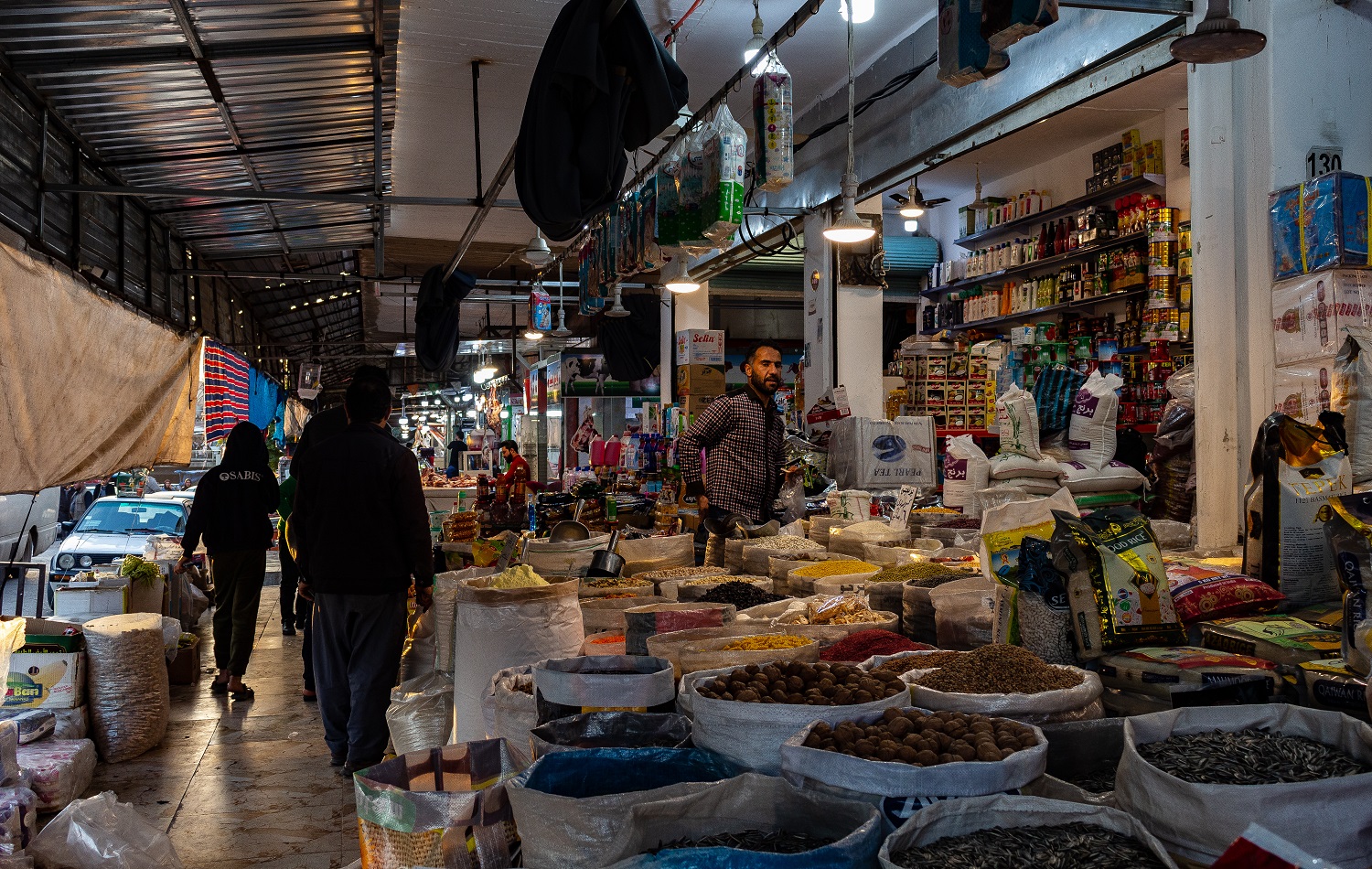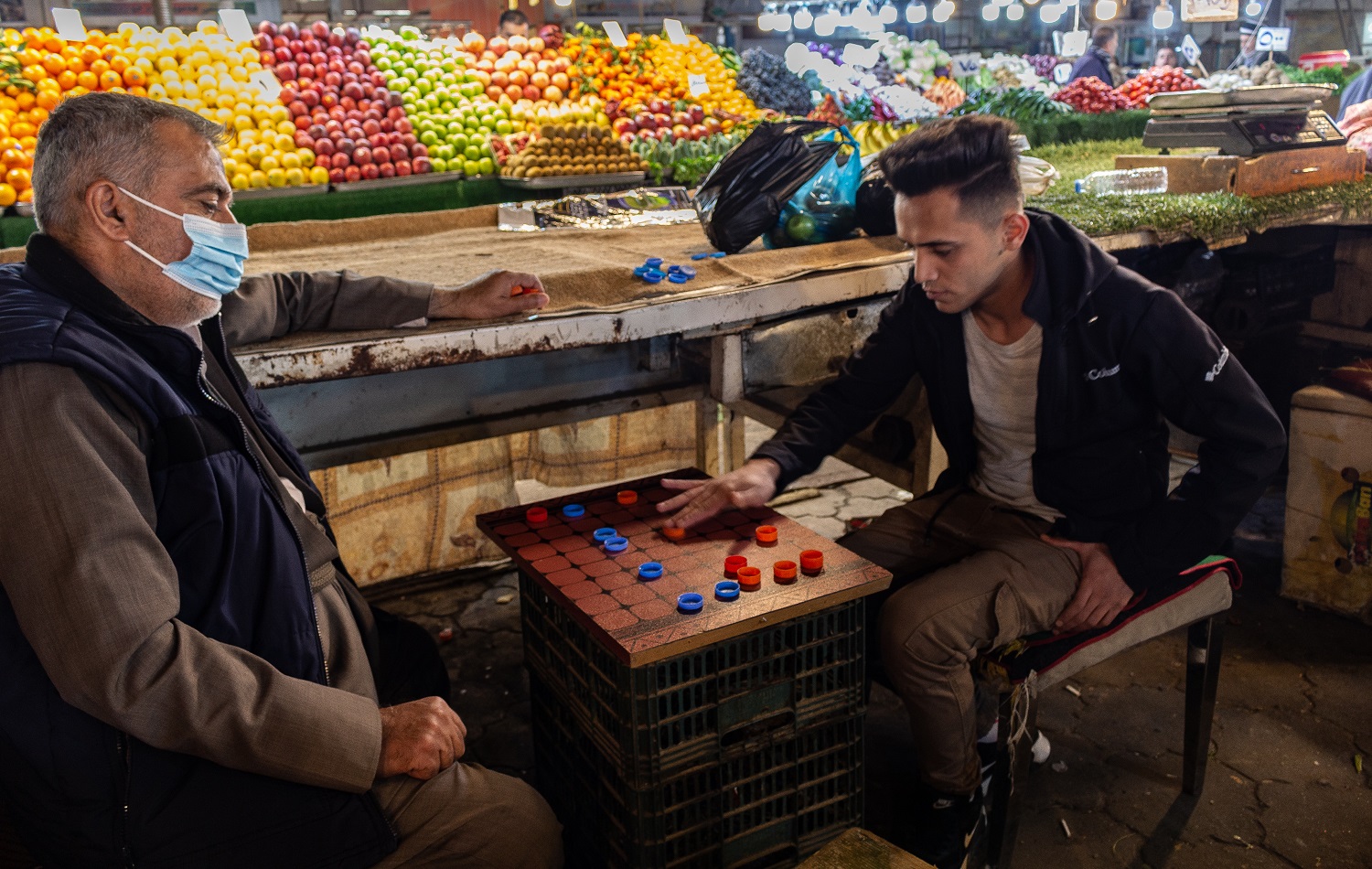ERBIL, Kurdistan Region — Shahla Jaffar carefully selects a handful of tomatoes from the mound of fruit spotlighted under a string of bright lights in the otherwise dim market. The 34-year-old mother, dressed all in black, is shopping for dinner for her six children and husband.
The Haidar Baqal bazaar is in Saidawa, one of Erbil’s poorest neighbourhoods. The sprawling market sells everything from basics like fruit and vegetables, slabs of butchered meat, cooking utensils, and clothing, to luxury items like gold jewelry and even a monkey in a cage alongside depressed cats and dogs waiting for some animal lover to take them home. But on a late Thursday afternoon, there’s not many people shopping.
“Everyone is jobless. There’s no salaries, no pensions,” said Sadiq Hassam. The 70-year-old vendor puts Jaffar’s tomatoes into a bag and hands them to her, in exchange for a few well-worn dinar notes.
Seven years of crisis after crisis have pushed more and more people into poverty in Iraq and the Kurdistan Region. Early in 2014, Baghdad stopped sending the Kurdistan Regional Government (KRG) its share of the federal budget after Erbil struck an oil export deal with Turkey. Later that same year, the Islamic State group (ISIS) swept across northern Iraq, sending millions of people to seek safety in the Kurdistan Region and pulling the country into a costly war. Grappling with increased demands on strained resources, the KRG introduced austerity measures that included slashing civil servant salaries and delaying payments.
In 2020, the coronavirus pandemic ground economies around the world to a halt and sent oil prices tumbling to record lows. The pressure on the oil-dependent economies of Iraq and the Kurdistan Region was too much to bear, and late last year Baghdad appeared to be heading toward bankruptcy. The Iraqi government devalued the dinar in December. Without the devaluation, there was “a high chance that the central bank reserves will be completely consumed” within six months, warned Finance Minister Ali Allawi at the time.
Iraq’s GDP contracted by 11 percent in 2020, according to the International Monetary Fund (IMF). It will take until 2024 to rebound to pre-pandemic levels, the IMF predicts, and that rebound is dependent on the government making “wide-ranging structural reforms.”
In October, the United Nations and World Bank predicted Iraq’s poverty rate would rise from 2017-2018 figures of 20 percent to just over 31 percent in 2020. The provinces of the Kurdistan Region are among the better off in Iraq, but they are not immune to rising poverty.
The hardships behind these numbers are keenly felt in Saidawa.
With her bag of tomatoes in hand, Shahla Jaffar says some nights all she can cook for her family is a simple meal of plain rice flavoured with tomato paste. Yet she counts herself among the lucky ones. Her husband is working in an auto repair shop and earns between 10,000 and 15,000 dinars ($6.85 - $10.25) a day. “We’re better off than most people. We’re still able to make a living. We’re able to have something,” she said.
Ibrahim Sulaiman has been selling onions and potatoes in Haidar Baikal bazaar for nearly 20 years. “Sometimes I sell 10,000 dinars worth, sometimes I don’t sell that much and never more than 15,000 a day,” he said. “I don’t have a lot of regular customers.”
It has gotten worse this year, after the devaluation of the dinar. “Everything has become more expensive,” he said.
A black and white checked scarf wrapped around his head, the 65-year-old grandfather says he depends on his pension to make ends meet. Sulaiman was a Peshmerga, fighting in Kurdish revolts against the Iraqi state in the 1970s. His brother was killed on Mount Makhoul in 1974. For his service, Sulaiman gets a monthly pension of 300,000 dinars ($205), but because of the government’s austerity measures, he doesn’t receive this every month.
In 2020, the KRG made salary and pension payments in just eight out of twelve months, with roughly a third of the funds coming from the irregular transfers Baghdad makes to Erbil.
“I make my way through it. God will open a door for me,” said Sulaiman with a shrug.
The Erbil social welfare directorate, operating under the KRG’s Ministry of Labour and Social Affairs, provides monthly assistance payments of between 100,000 and 150,000 dinars to 13,000 people from across the province. Since 2014, however, they have not accepted any new requests for assistance because the cash-strapped government doesn’t have the funds.
“People come here daily” asking for help, said Zana Ahmed, who works at the directorate. They are sent away, empty handed.
But not everyone in Erbil is feeling the squeeze. In wealthier neighbourhoods like Dream City, people drive Range Rovers and BMWs to eat, drink, and smoke shisha in cafes, running up a bill that is multiple times over the daily earnings of the city’s poor.
Niyaz Najad has been selling material for jili kurdi, traditional Kurdish dresses, in Haidar Baqal bazaar for 15 years. He sees a growing class divide.
“Erbil is not nice anymore. It’s nice for the people who have money, but not the lower classes,” he said. The wealthy can go anywhere they want, do what they like, and are treated with respect, “but it’s not the same for the poor.”
The poor, he said, are living with pain and hardship, and only blind hope that it will get better.
The occasional customer strolls into Najad’s shop to browse or ask if he has a specific style of material, but no one is actually buying. Since 2014, sales are “going down year by year. We always say it will get better, but it gets worse,” said the 32-year-old father of three. And since Baghdad devalued the dinar in December, “the market has completely stopped.”
Najad has to dip into his savings to cover daily expenses and when his children ask for something, he puts them off with promises of next week, next month, next year. “I feel like my children are missing a lot of the nice things in this world,” he said.
In the mid to late 1990s, the two ruling parties of the Kurdistan Region, the Kurdistan Democratic Party (KDP) and the Patriotic Union of Kurdistan (PUK), fought a brutal civil war. Tens of thousands of families were displaced from their homes and hundreds were killed. Najad said that 2021 feels like 1997 all over again, “because it was the worst year of our lives.”
Additional reporting by Khazan Jangiz




